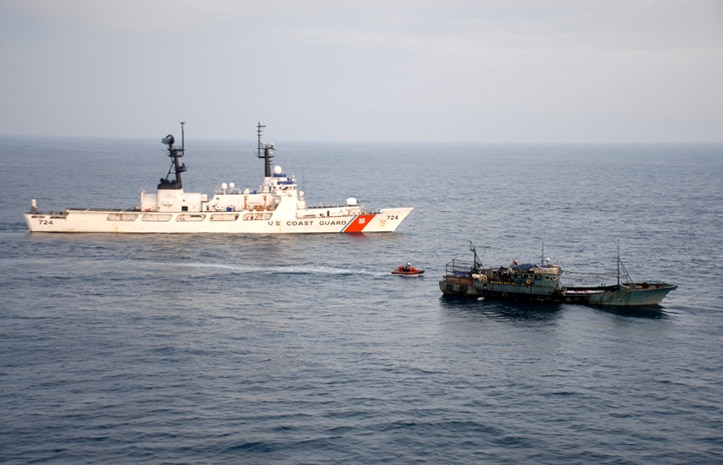 Photo Courtesy: U.S. Department of State, Office of Marine Conservation
Photo Courtesy: U.S. Department of State, Office of Marine Conservation
Combatting IUU Fishing Through Public-Private Partnership
Addressing illegal, unreported, and unregulated (IUU) fishing is challenging to confront due the ocean’s vast nature and lack of uniformity in state response to maritime issues. Additionally, each coastal State is ecologically unique and presents different concerns and approaches to combatting IUU fishing practices. Public-private collaboration is key to circumventing the challenges surrounding varying state EEZ enforcement procedures and to producing sustainable long-term maritime security.
IUU fishing in the Gulf of Mexico
Mexican fishers, commonly fishing in small artisanal boats known as lanchas, have posed a historical problem for U.S. maritime security in the Gulf of Mexico. U.S. Coast Guard enforcement against IUU fishing practices results in sizeable interdictions of Mexican lanchas fleets. Demand for policing IUU fishing is mounting—the Coast Guard sector at Corpus Christi says its crews have interdicted 45 lanchas, detained 183 fishers, and seized a total of 10,861 pounds of catch since the beginning of the year.
Individual civil sanctions proved to have little deterrent effect throughout the 1990s for failures to serve violators properly—even when served, the administrative penalties were often not paid. In 2005, the U.S. government shifted its focus to cooperation with the Mexican government. Discouragingly, a report to Congress developed pursuant to the Maritime Security and Fisheries Enforcement Act revealed that the Mexican government was not taking any enforcement or punitive actions related to the lanchas detained in U.S. waters and repatriated to Mexico.
Within Mexico’s EEZ, relaxed regulation and enforcement failures surrounding IUU fishing practices are jeopardizing ocean ecosystems and endangering marine populations. U.S. Coast Guard IUU fishing enforcement and monitoring in the Gulf of Mexico is vital to protect the U.S. EEZ against the same destruction.
IUU fishing in the Gulf of California
In a recent policy shift, the Mexican government has relaxed enforcement efforts surrounding IUU fishing in the Gulf of California. This move has de-stabilized global fishing management efforts and threatened local species and ecosystems endemic only to this region. In lifting IUU fishing enforcement measures within a former “no tolerance” zone, the Mexican administration has exposed the near-extinct vaquita porpoise (Phocoena sinus) and critically endangered totoaba fish (Totoaba macdonaldi) to the international illegal seafood smuggling industry.
Lanchas frequently utilize prohibited gillnets in catching totoaba fish for sale to international totoaba smugglers. Highly valued for their perceived health benefits, Totoaba swim bladders can fetch prices between $20,000 and $80,000 in China. International totoaba traders, most of whom are Chinese nationals, stand to profit substantially from the Mexican government’s failure to implement or enforce IUU fishing practices in the Upper Gulf of California.
Solutions
Creating meaningful deterrence and comprehensive monitoring against IUU fishing is often tricky due to the varying enforcement capabilities of state actors. As a result, combatting this issue will require public-private partnerships to provide consistent enforcement measures and generate public awareness.
One example of effective public-private collaboration is modeled by Sea Shepherd, a non-profit conservation group working with governments in the Upper Gulf of California and other regions threatened by IUU fishing. In 2015, Sea Shepherd launched ‘Operation Milagro,’ a campaign partnering with Mexican authorities and researchers to remove gillnets and other illegal fishing gear threatening vaquita populations. After six seasons, more than 1000 pieces of illicit gillnets and other gear were removed from the Upper Gulf of California. By increasing enforcement presence and vessel interdiction, these partnerships present a more united front against illegal fishing.
In 2020, the Center for Biological Diversity filed a lawsuit against the U.S. Department of the Interior, inducing administrative action through a federal statute known as the Pelly Amendment. This federal statute authorizes the department to move for sanctions against Mexico for vaquita endangerment in the Upper Gulf. The lawsuit generated the political traction necessary for the U.S. National Marine Fisheries Services to expand a ban on imports of seafood products caught in the vaquita’s habitat.
Additionally, the Center for Biological Diversity and a coalition of other private environmental groups have prompted further sanctions for Mexico’s refusal to act against IUU fishing. After submitting a determination that Mexico has failed to enforce the General Wildlife Act, a commission for Environmental Cooperation authorized by the United States Mexico Canada Agreement (USMCA) published allegations against the Mexican government that its administration failed to enforce vaquita porpoise protections. Mexico has sixty days to respond to these claims; at that point, the commission will decide whether a full factual investigation of the issue is warranted. Should the state be found non-compliant with its environmental obligations to protect the vaquita, the United States may request official enforcement actions against Mexico, including further trade sanctions.
In July 2021, the Department of Defense announced an algorithm development competition intended to enlist private technology companies in the fight against IUU fishing. The xView3 competition’s $150,000 prize attracts skilled participants to submit novel data assessment tools for detecting “dark vessels” illegally operating on the high seas. Because many IUU fishing vessels turn off their on-board monitoring devices to avoid detection, this program seeks to develop more reliable tools to strengthen interdiction and enforcement capabilities. This partnership is a particularly forward-thinking approach to IUU fishing oversight in consulting private technology companies for input in monitoring strategies.
Because the economic and ecological destruction occurring as a result of IUU fishing affects the interests of states beyond one particular maritime jurisdiction, public-private partnerships are essential to combat this problem. Collaboration between agencies, governmental bodies, and private organizations can create innovative and diverse solutions to IUU fishing through democratic engagement, physical presence, and technical oversight.





